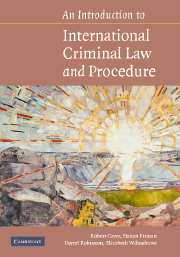Book contents
- Frontmatter
- Contents
- Preface
- Table of Cases
- Table of Treaties
- Table of Abbreviations
- Part A Introduction
- Part B Prosecutions in National Courts
- Part C International Prosecutions
- Part D Substantive Law of International Crimes
- Part E Principles and Procedures of International Prosecutions
- 15 General Principles of Liability
- 16 Defences/Grounds for Excluding Criminal Responsibility
- 17 Procedures of International Criminal Investigations and Prosecutions
- 18 Sentencing, Penalties and Reparations to Victims
- Part F Relationship Between National and International Systems
- Index
- References
16 - Defences/Grounds for Excluding Criminal Responsibility
- Frontmatter
- Contents
- Preface
- Table of Cases
- Table of Treaties
- Table of Abbreviations
- Part A Introduction
- Part B Prosecutions in National Courts
- Part C International Prosecutions
- Part D Substantive Law of International Crimes
- Part E Principles and Procedures of International Prosecutions
- 15 General Principles of Liability
- 16 Defences/Grounds for Excluding Criminal Responsibility
- 17 Procedures of International Criminal Investigations and Prosecutions
- 18 Sentencing, Penalties and Reparations to Victims
- Part F Relationship Between National and International Systems
- Index
- References
Summary
Introduction
Defences (or in the terminology of the ICC Statute ‘grounds for excluding criminal responsibility’) are an oft-forgotten aspect of international criminal law. Jurisprudence from the international criminal Tribunals on the matter is sparse, and not always satisfactory. There are a number of reasons for this, one of which also at least partially explains the relative lack of scholarly attention given to most defences in international criminal law. This is the tendency towards a lack of sympathy for defendants in international criminal proceedings. As Albin Eser has said, there are ‘certain psychological reservations toward defences. By providing perpetrators of brutal crimes against humanity … with defences for their offences, we have effectively lent them a hand in finding grounds for excluding punishability.’ It is the purpose of this chapter to set out and critique the law relating to defences, in both treaty-based and customary international law. This chapter is primarily concerned with substantive defences to international crimes, it does not deal with issues such as immunity, youth, ne bis in idem or limitation periods. These are not defences for conduct, but pleas as to the jurisdiction or right of a court to try a person, both of which are separate matters.
The types of defences
At the outset, certain terminological and conceptual matters ought to be discussed. In the common law world, it is usual to speak of ‘defences’ in the omnibus sense whereas in civil law jurisdictions a firm distinction is drawn between types of defences, in particular between justifications and excuses.
- Type
- Chapter
- Information
- An Introduction to International Criminal Law and Procedure , pp. 331 - 348Publisher: Cambridge University PressPrint publication year: 2007



